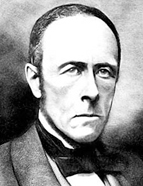

The apologia of municipalism, the main metapolitical component of História de Portugal, also voiced in many of Herculano’s writings, is in fact the other side of the coin on which his criticism of centralism is engraved – focusing both on state policy and on the Catholic Church itself. It is this rebellious drive that underlies A origem e o estabelecimento da Inquisição em Portugal [“History of the origin and establishment of the Inquisition in Portugal”,], the three volumes of which were published in 1854, 1855 and 1859, respectively. However, it is not possible to fully understand the purposes and meanings behind this work without recalling the controversy that marked the reception of História de Portugal. The first and second of Herculano’s longest writings on history are therefore intricately interwoven and there is far more than pure epistemic curiosity in the threads that link them.
Factual issues were at the root of this controversy, mainly related to the historicity of the so-called miracle of Ourique – the historical myth of the apparition of Jesus Christ to Afonso Henriques on the most decisive battlefield for the political emancipation of Portugal, thereby legitimising the morally complicated line of action followed by Afonso Henriques who would shortly become the first king of Portugal. In his book, Herculano did not devote much of his attention to the battle of Ourique which, in itself, represented a position against the traditionalist view of national history. He referred to the event being surrounded by “fables no less absurd than brilliant” stressing that that event had not been mentioned in the Arab chronicles and had only been mentioned, albeit briefly, by the 12th century Christian chroniclers (História de Portugal, I, 429; 435). In the documental criticism included at the end of the volume, Herculano argues that the apparition of Christ in the battle was grounded on a “poorly forged” document (História de Portugal, I, 658): the supposed account of the battle by Afonso Henriques himself, was “discovered” only in the late sixteenth century (Cintra, “A lenda de Afonso I” ["The legend of Afonso I"], 73-74).
Growing criticism from the press and church pulpits placed Herculano in the line of fire of a cultural war sparked by the reactionary field following its dismantlement in 1834 (Saraiva, Herculano e o Liberalismo em Portugal, 161). In response to such provocation, in 1850 Herculano wrote Eu e o Clero [The clergy and I], a public letter to the cardinal-patriarch of Lisbon. He then published a great number of responses to his detractors, many of which were replicated and triplicated, all resulting in a hefty spiral of controversy (Buescu, O Milagre de Ourique [The miracle of Ourique]). The philological discussions underlying the controversy rapidly faded into the background, while Herculano geared most of his statements towards themes related to the national and ecclesiastical politics of the day.
